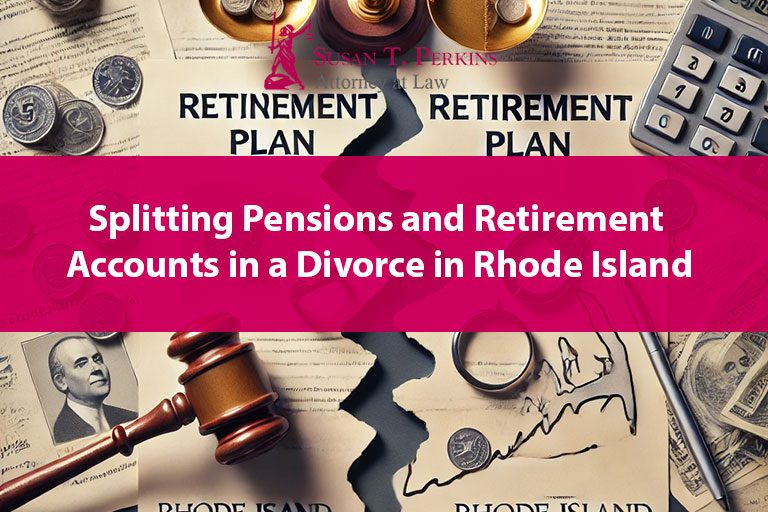Getting divorced is rarely a straightforward process. In almost every case, there are numerous assets and financial details to sort out—and doing so is often an emotional process. If you’ve found yourself overwhelmed by the idea of splitting pensions and retirement accounts in a divorce in Rhode Island, know that you don’t have to do it alone.
Susan T. Perkins has 25+ years of experience helping people successfully navigate situations very similar to yours. While 38% of marriages in the US end with divorce, it doesn’t mean you have to give up everything that’s rightfully yours in the process.
The most important thing to know here is that Rhode Island follows laws of equitable distribution—and no, the division isn’t always a 50/50 split. Read on for answers to your most pressing questions and important details you should be aware of.
Are Retirement Accounts Considered Marital Property in Rhode Island?
Yes, retirement accounts are considered marital property in Rhode Island, per R.I. Gen. Laws § 15-5-16.1. Any retirement assets you two accumulated over the course of your marriage are subject to division if you divorce.
In Rhode Island, marital property includes any assets and debts acquired by either of you during the marriage—regardless of whose name is on the account or title.
So, 401(k)s, IRAs, pensions, and other retirement savings plans will be divided as a result of your divorce. To be clear, this is true even if one spouse didn’t work for the duration of your marriage.
Separate property, on the other hand, includes anything that was yours before the marriage, as well as inheritances or gifts given to one specific spouse.
Things start to get complicated if you commingled this property with marital assets. For example, if you deposited inheritance into your retirement account, it may be split between you.
Does Rhode Island Follow Equitable Distribution for Dividing Pensions and Retirement Accounts?
Yes, Rhode Island follows equitable distribution for dividing pensions and retirement accounts in a divorce. It’s essential to understand the true definition of this term.
The court will aim to divide your assets fairly, not equally. This is different from many other states that split assets 50/50 no matter what. They do so by considering a range of factors, including:
- Who contributed how much to each account
- Each spouse’s financial situation
- The length of your marriage
- Each spouse’s future earning potential
Let’s say one spouse spent years at home managing the household while the other worked. The court may adjust the division to account for this contribution, even though it was non-financial.
Also note that any pre-marital contributions to your own retirement accounts are typically considered separate property, though it can be challenging to prove the distinction.
The Process for Splitting Pensions and Retirement Accounts in a Divorce in Rhode Island
Now that you better understand what’s at stake, let’s discuss the typical process for splitting pensions and retirement accounts in a divorce in Rhode Island. Knowing how this process works is crucial to protect your financial future.
Dividing Pensions
Dividing pensions is one of the most complex parts of an RI divorce. The court’s priority is determining which portion of the pension was accumulated during marriage, and which portion came before. Then, they divide the marital portion between you two, typically in one of two ways:
1. Deferred Division. The non-employee spouse receives a percentage of the pension when the employee spouse retires.
2. Buyout or Offset. One spouse may waive their right to the pension in exchange for other marital assets of similar value, such as the marital home or cash.
Splitting Retirement Accounts
Retirement accounts like 401(k)s, IRAs, and 403(b)s follow a slightly different process that follows the same principle: the non-employee spouse gets a percentage of the balance accrued over the course of the marriage.
So, pre-marital contributions and post-divorce growth are generally excluded. With most accounts, the funds can be transferred from one spouse to the other without triggering taxes or penalties—so long as you follow the proper process.
Qualified Domestic Relations Order (QDRO)
A term you have to understand is “Qualified Domestic Relations Order,” or QDRO. This is a legal document required to divide certain types of retirement accounts, like 401(k)s and pensions, during divorce.
It’s a court-issued order that allows retirement plan administrators to legally transfer a portion of one spouse’s account to the other without violating federal regulations. Here’s how the process usually works:
1. Drafting the QDRO. Your attorney drafts the document, and it must comply with the specific rules of the retirement plan in question.
2. Submitting the QDRO for approval. The QDRO is sent to the retirement plan’s administrator for review. They check to confirm it meets all relevant requirements.
3. Court Approval. Once the plan administrator approves, the QDRO goes to the court for final authorization.
Also know that not all retirement accounts require a QDRO. But for the accounts that do, mistakes in the paperwork can lead to major delays—or even a loss of benefits. It’s crucial that you work with an experienced Rhode Island divorce attorney to draft it correctly.
Should You Seek Financial Advice Before Splitting a Retirement Account?
Yes, it’s very wise to seek financial advice from a financial analyst or forensic accountant before splitting a retirement account. You see, it’s true that a great attorney will guide you through the many legal aspects of your divorce.
But financial professionals can help you fully understand the short- and long-term impacts of dividing your retirement assets. Here are some of the ways they can help:
- Valuing accounts – Understanding the present and future value of all of your accounts
- Tax implications – Assessing the potential tax consequences of splitting or rolling over funds
- Retirement planning – Confirming that your share of the assets aligns with both your financial goals and future security
Mistakes made during this process can cause ripples across your life for years to come. Always work with trusted experts whenever possible.
Divorce is never easy, but it doesn’t have to ruin your financial future. With over two decades of experience, Susan T. Perkins understands the deep complexities of splitting pensions and retirement accounts in a divorce in Rhode Island. She—and our entire legal team—are here to protect your rights and help you protect what’s rightfully yours.
Every divorce is unique, and the decisions you make now will affect you for years, if not decades. Don’t leave something as critical as your retirement to chance. Contact us today at 401.324.2990 today for your free consultation.

 CALL US NOW
CALL US NOW







